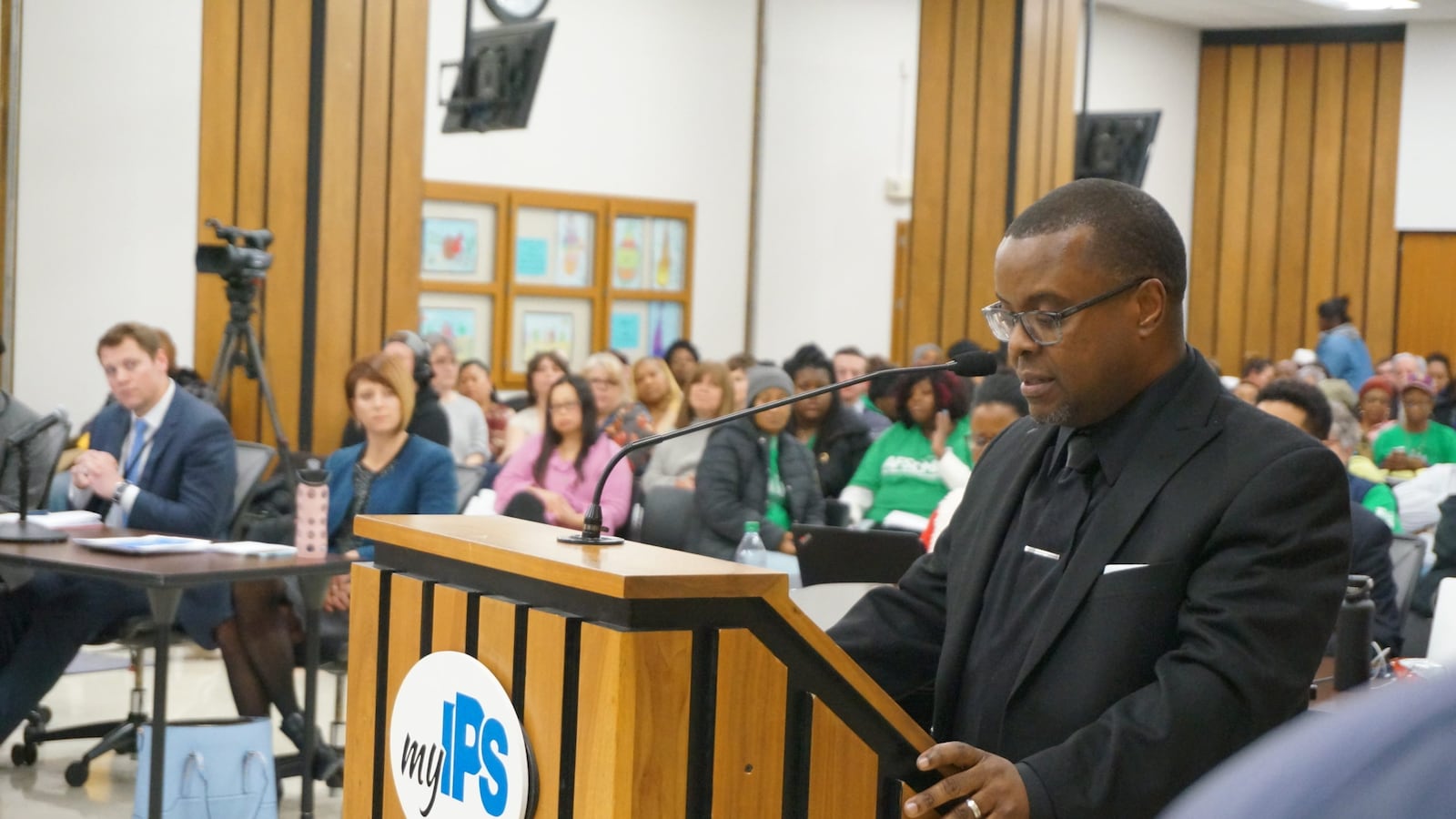At an emotional and sometimes rowdy school board meeting, parents, teachers, and activists rallied to convince the Indianapolis Public Schools board that it should not overhaul two struggling campuses and hand control over to new, outside managers.
One after another, about a dozen speakers came to the podium to share their stories about School 48 and School 67, telling board members that those schools are getting better and have dedicated principals and teachers who should not be replaced. Their arguments built on the ones School 67 families and educators made at another board meeting two days before.
It was a rare level of vocal, organized opposition to the district’s strategy of restarting campuses with chronically low test scores and turning them into so-called innovation schools. If the board approves Superintendent Aleesia Johnson’s recommendation to restart the schools, the new managers would likely hire new principals, teachers, and other staff. The teachers at the overhauled schools would not be employed by the district and would not be covered by the union contract.
The board is expected to tentatively decide in February whether to pursue the overhauls and if so to consider contracts with new operators in March.
In making the case to restart the schools, district officials pointed to low state test scores and the results of district-led quality reviews, which assess schools through visits, interviews, and surveys. School 48, which is also known as Louis B. Russell, has received five consecutive failing grades from the state. School 67, which is also known as Stephen Foster, has received two failing grades.
“There are undoubtedly bright spots. And the gains that have been made can and should be celebrated,” said Jamie VanDeWalle, who oversees innovation schools for the district. But she concluded that given the “level of change” that’s needed at the schools, “we believe an innovation restart is the tool that we should leverage at this time.”
The district has handed six struggling neighborhood schools to charter operators since it began creating innovation schools in 2015, and the board has approved all of the restarts recommended by the administration. But last year, three newly elected members joined the board, former Superintendent Lewis Ferebee left for another post, and Johnson — who was interim superintendent at the time — did not recommend restarting any schools. That makes the decisions on School 48 and School 67 significant tests of the board’s current support for the aggressive strategy.
Many of the board members appeared torn, expressing concerns about the intense opposition from families and raising a litany of questions about both the quality of the schools and the process for selecting them.
School board member Diane Arnold acknowledged the frustrated comments, saying that the district needs to find a way to involve families earlier in the process. “I do feel like a lot of these parents feel blindsided,” she said.
Whether the board will ultimately support the restarts remains unclear.
“We want stability and we want performance, too,” said board member Susan Collins.
The schools also face unusual challenges that some commenters highlighted. At School 67, nearly 45% of the 600 students are English language learners — about twice the district average. The campus, which begins with prekindergarten, has also expanded over the past three years to serve middle school.
At School 48, about 24 percent of students have special needs, compared to 17 percent districtwide. The elementary school is in the gentrifying northside neighborhood of Mapleton-Fall Creek, and it has shrunk over the past decade to fewer than 300 students.
Most of the opponents who spoke this week were from School 67. But on Thursday, they were joined by a handful of people from School 48, including Principal Arthur Hinton, who has led the campus for nearly three years.
Staff and supporters of School 48 work to understand students and help them do their best, Hinton said, explaining: “No two-week test window can create a clear picture of who our children are and what they need.”
Delario Bledsoe, a School 48 parent, told Chalkbeat after a meeting at the school Monday that he’s worried that adjusting to new teachers will be hard on the students. His son has been at School 48 since preschool, and he is now in third grade. Bledsoe said the family has had a good experience at the school, and he just learned it is getting failing marks from the state. “I’m just shocked about that,” he added.
Joseph White, another parent at School 48, said he’s not completely opposed to the restart. But he’s worried that the new teachers won’t be as dedicated. His daughter, who was born four months premature, is in the pre-kindergarten program for students with special needs. When she started last year, she couldn’t walk, White said. Now, she is thriving, walking and singing her numbers and letters.
“This is stuff that she does that she never did before,” White said. “The work I see here is definitely not an F.”


